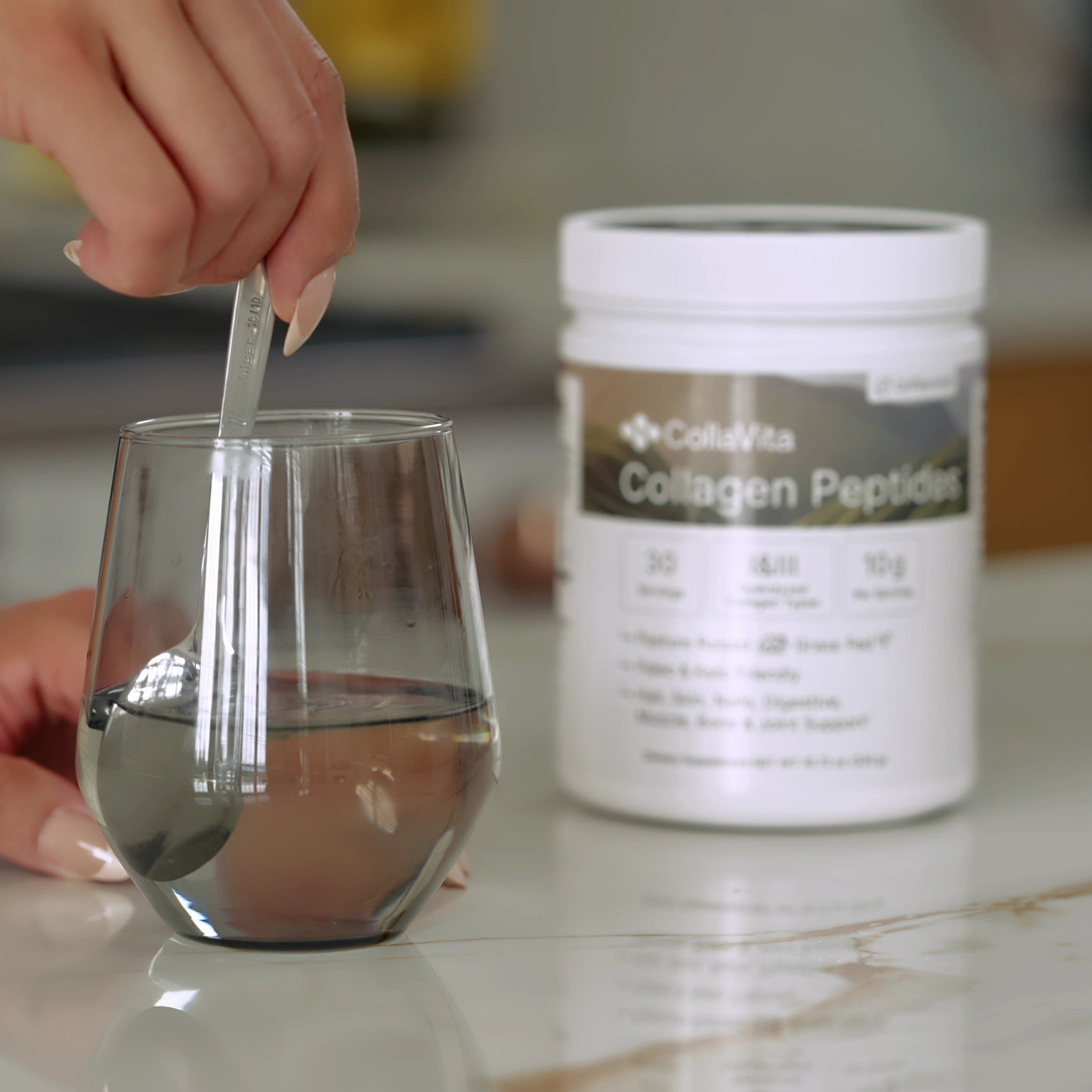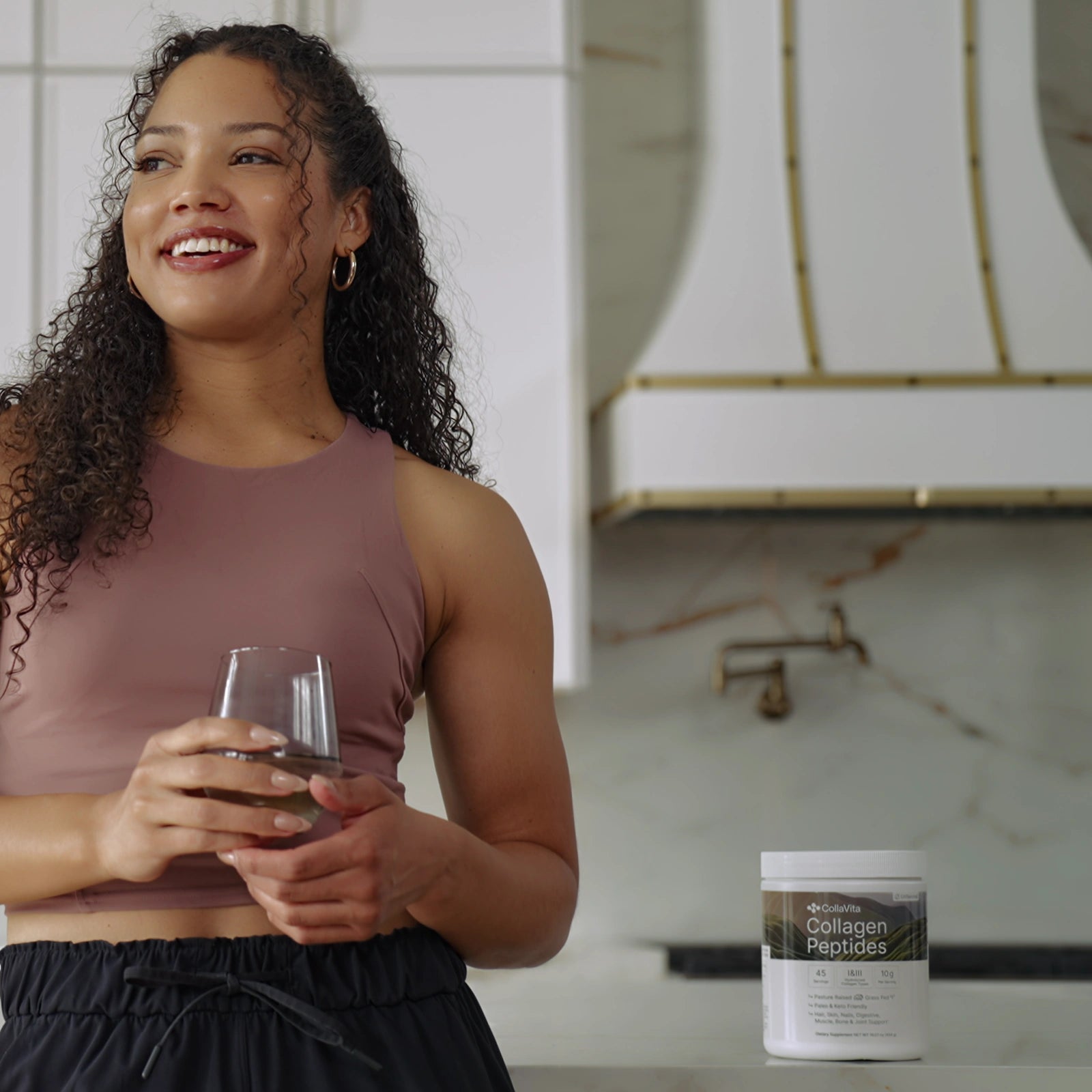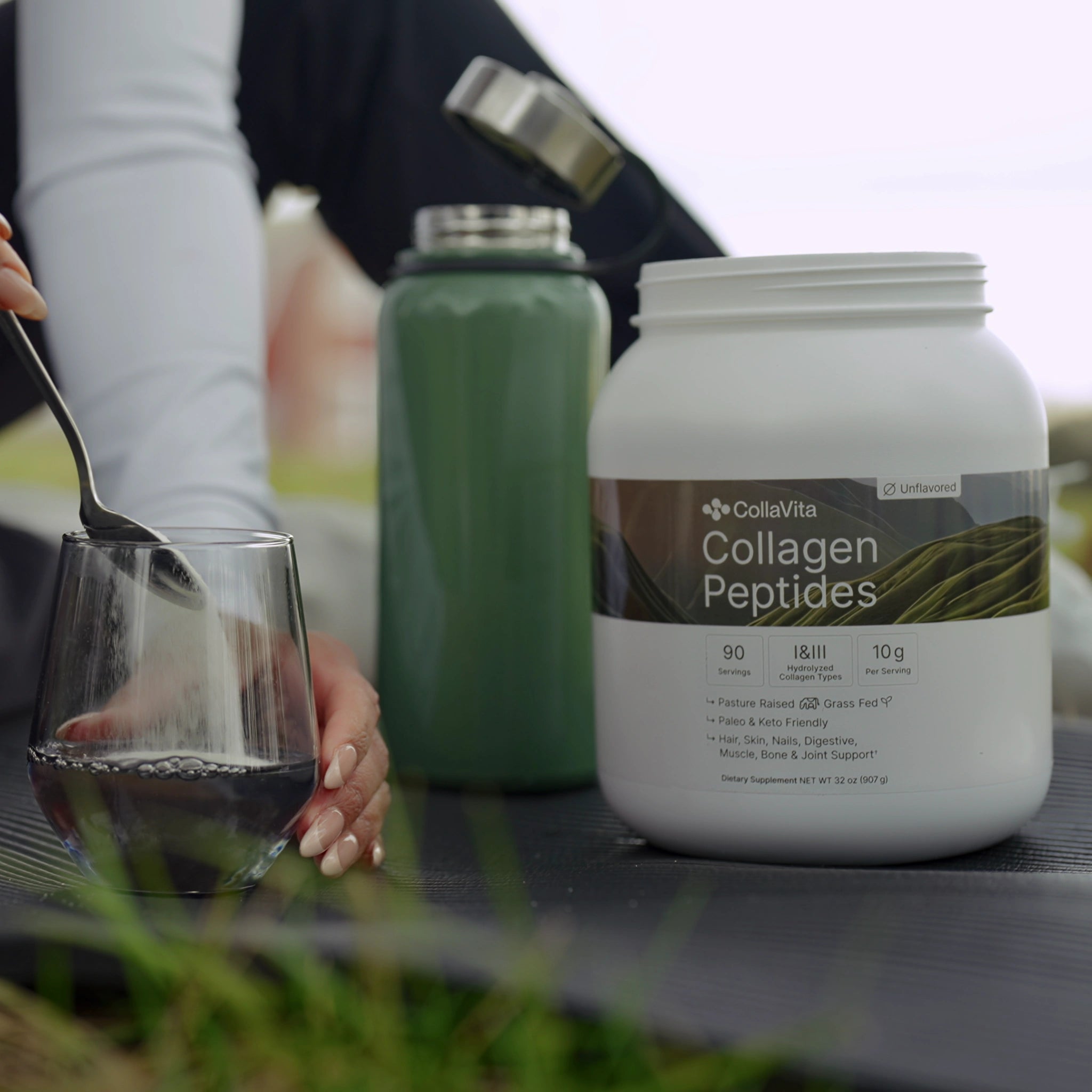1. Improved Skin Elasticity
Collagen helps keep skin firm and elastic. As we age and lose collagen, our skin can become dry, saggy, and wrinkled. Research shows that taking collagen supplements can improve skin hydration and elasticity and reduce wrinkles. A Journal of Drugs in Dermatology study (1)(Bolke et al., 2019) found that oral collagen made the skin firmer and more hydrated.
A 2021 systematic review published in the International Journal of Dermatology(2) confirmed that hydrolyzed collagen improved skin texture and moisture after 90 days.
Another research(3) showed that 2.5g collagen per day for 8 weeks increased key skin proteins and reduced wrinkles by 20%, and the effects lasted weeks after stopping taking collagen.
These findings suggest that collagen is an effective supplement for smoother, firmer, and younger-looking skin.

2. Improved Bone Health
Bone health is another benefit of collagen for men and women, especially after their 50s. A decline in collagen levels contributes to bone and joint degeneration, though osteoporosis is primarily caused by hormonal changes, calcium and vitamin D deficiencies, and genetic factors. Collagen plays an essential role in bone structure by maintaining its integrity and supporting bone mineral density. Women, in particular, are at higher risk for age-related bone loss, making collagen supplementation potentially beneficial for maintaining bone health. A study published in Nutrients (König et al., 2018)(4) examined the impact of postmenopausal women taking a 5 g supplement of specific collagen peptides (SCP) daily. Over 12 months, women who took collagen saw their lower spine and hip bones become denser and stronger, while those who didn't lost bone mass.

3. Healthier Nails
Collagen helps strengthen nails that are weak, brittle, or break easily. People who took 2.5 grams of collagen daily for 6 months had nails that grew 12% faster and broke 42% less often, according to a study (5) published in the Journal of Cosmetic Dermatology in 2017. Even a month after stopping, most participants still had stronger nails. About 80% of them also said their nails looked better and felt healthier. While collagen isn’t a miracle fix for all nail problems, it can support overall nail strength and health.

4. Improved Muscle Mass
Collagen helps keep muscles and tendons strong, which makes movement and exercise easier. As people age, they naturally lose muscle, but research shows that collagen supplements can help slow this process. In one study (6), older men with muscle loss followed a 12-week workout program while taking 15 grams of collagen daily. The men who took collagen gained more muscle—about 9 lbs ( 4.2 kg)—compared to 6.4 lbs ( 2.9 kg) in those who didn’t. They also got stronger at a faster rate. This suggests that taking collagen along with regular exercise may help people stay stronger as they age.

5. Reduced Joint Pain
Collagen is part of cartilage, the tissue that cushions joints and allows them to move smoothly. As cartilage wears down with age or overuse, it can cause joint pain and stiffness, a common problem in osteoarthritis. Research suggests collagen supplements may slow down this breakdown and reduce joint discomfort.
A 24-week study(7) (Clark et al., 2008) on athletes found that collagen hydrolysate reduced joint pain associated with exercise. Another review(8) (Moskowitz, 2000) found that collagen hydrolysate (from gelatin) may support cartilage repair and joint health, especially for those with osteoarthritis.
Overall, taking collagen regularly may keep your joints healthy and pain-free, especially for active people and those with joint conditions.

6. Prevention of Bone Loss
Collagen makes up a large part of bones and cartilage. As people age, collagen levels drop, which can weaken bones. Women tend to lose bone mass earlier than men, especially after menopause.
Research suggests that taking collagen before major bone loss starts can help. A study(9) (Khatri et al., 2020) finds that taking 5–15 grams of collagen daily improves collagen synthesis and supports the structure of connective tissues. For the best results, the study recommends taking collagen about an hour before exercise, as movement helps bones absorb it more effectively. Additionally, taking collagen with vitamin C enhances its effects because vitamin C helps the body use collagen properly.
Read more: 'How to Boost Collagen Production?'
7. Improved Wound Healing
Collagen plays a key role in wound healing by helping the body build new tissue. It keeps wounds hydrated and supports cell regeneration, speeding up recovery.
Collagen dressings have been shown to work better than standard wound care treatments. One study (10) found that wounds treated with collagen had 90% more new tissue growth in the first week compared to untreated wounds.
This makes collagen an effective option for potentially improving recovery from cuts, burns, and surgical wounds.

8. Improved Gut Health
Collagen’s benefits extend beyond skin and joints—It also helps protect your stomach and intestines. It contains special proteins that keep the gut lining strong and prevent harmful substances from leaking into your body. A study looked at people who took collagen from fish skin. It showed that collagen helped repair weak spots in the gut by strengthening important protective proteins. This means collagen may help with stomach problems like bloating, irritation, and digestive issues.

9. Reduced Wrinkles
Wrinkles happen when your skin loses collagen, which contributes to the firmness and smoothness of the skin. Sun exposure speeds this up by breaking down two important types of collagen, Type 1 and Type 2. When collagen levels drop, skin loses its strength, leading to fine lines and wrinkles.
Some people use collagen creams, but these mostly work on the surface. Research suggests that taking collagen supplements can improve skin elasticity from the inside. People who took hydrolyzed collagen for at least 8 weeks had firmer, smoother skin and fewer wrinkles, according to research (11) published in Nutrients (Szu-Yu Pu et al., 2023).

10. Healthier Hair
Collagen helps hair grow because it supports keratin, the protein that makes up hair. It also keeps your scalp and hair roots strong.
A study (12) in Experimental Dermatology (Lee JO et al., 2024) found that collagen peptides help hair grow by improving how hair cells work together. Another study tested a special collagen treatment (Cellcurin) with microneedling. After 12 weeks, people had thicker, fuller hair. It worked even better than minoxidil, a common hair loss treatment.
These studies show that collagen may help hair grow stronger, but more research is needed.

11. Improved Hydration
Collagen helps your body hold onto water, keeping your skin and tissues hydrated. Just like soil needs water to stay healthy, your skin needs moisture to stay soft and flexible.
Your cells are about 70% water, and collagen helps them hold onto that moisture. This keeps your skin from drying out and cracking. Drinking enough water and having enough collagen can keep your skin looking fresh and healthy.
12. Promoting Blood Clotting
Collagen is in the walls of blood vessels. When you get a cut, collagen helps platelets stick together to stop bleeding and form a clot.
Collagen also contains glycine, an important amino acid that helps make hemoglobin, the part of your blood that carries oxygen. Without enough glycine, your body can’t make healthy blood. It also helps create fibrinogen, which is essential for clotting.

13. Providing a Protective Covering for Organs
Collagen forms a protective layer around your organs, like your liver, kidneys, and intestines. It keeps them strong and flexible so they can work properly.
Just like an eggshell protects the inside of an egg, collagen helps shield your organs. It also helps them get the water and nutrients they need to stay healthy.

Want to Dive Deeper into the World of Collagen?
We have endeavored to elucidate several advantages associated with collagens; however, to fully realize these benefits, it is essential to acquire a deeper understanding of collagens. Let us analyze this challenging topic to comprehend it more effectively.
This section discusses collagen types, the best way to get it, and healthier options. Additionally, it discusses alternative foods to collagen and the methods for maintaining collagen levels in the body.
What are the Different Types of Collagen?
Research has identified 28 different types of collagen, and more are being discovered. Nevertheless, only types 1, 2, 3, 4, and 5 collagens are prevalently present in the human body.
The distribution of collagen within the human body is typically as follows:
- Type I collagen: The most common form of collagen is found in the skin, tendons, ligaments, bones, and teeth.
- Type II collagen: Common in cartilage tissue and keeps joints healthy.
- Type III collagen: Supports the structural integrity of organs, especially in the liver, bone marrow, and lymphatic system.
- Type IV collagen: Found in basement membranes (basement membrane) and provides stability of these structures. Our brain also contains type 4 collagen.
- Type V collagen: Found in tissues such as hair, skin, and cell surfaces.
In terms of their distribution, these collagens in our body possess a complex structure. For example, Type 1 collagen, which is predominantly present in the skin, can also be detected in our bones, joints, or internal organs. This is also applicable to the other collagen types.
So, the benefits of collagen type 1 and 3 are not only on the skin but also on your joints. Likewise, the type II collagen benefits can be observed in the joints, as well as in the skin and internal organs.
Where Does Collagen Come From? Exploring the Sources
Sources of collagen are derived from animal proteins; however, it is impossible to satisfy one's collagen requirements through the consumption of animal proteins that contain collagen. To get collagen, you need to get it in its form.
Basically, there are two main ways you can get the collagen. The initial method involves consuming all parts, from the skin to the bones and cartilage. This works with fish products such as anchovies, sardines, and salmon, but if you are looking for collagen in meat and poultry, try boiling it for a long time. Boil whole chicken or marrow bones for 8 to 10 hours to extract sufficient collagen. An evening glass of meat or chicken broth will supply the necessary collagen.
What are the Alternatives of Collagen?
If you are unable to consume foods that contain collagen due to a medical condition, you can enhance your body's collagen production and safeguard your existing collagen by utilizing collagen alternatives like herbal products.
Plants can provide protection or even increase collagen levels in the body in a variety of ways.
- Herbal vitamin C supplements are the most crucial of these. These supplements are essential for collagen to be absorbed. Put simply, collagen cannot be synthesized in the absence of vitamin C.
- Secondly, copper and zinc, especially from foods such as nuts, protect the structure of the collagen and prevent the collagen from deteriorating.
- Another advantage of plants for collagen synthesis is their role in preserving the body's hydration equilibrium through the use of supplements or topical applications, such as chia seeds, avocado, and aloe vera. Maintaining the body's water balance prevents the necessity of water in collagen, thereby averting collagen degradation.
- Last but not least, the effect of herbs in maintaining collagen health is through stimulating collagen-producing enzymes. Foods including chia seeds, turmeric, green tea, garlic, and spinach enhance the synthesis of enzymes that facilitate collagen production in the body.
What are Collagen-Rich Foods?
The most important collagen-rich foods are proteins obtained from the skin, joints, marrow, bones, and offal of foods such as chicken, fish, and cattle. To consume a food abundant in collagen, the most accessible options are bone broth, chicken broth soups, and stuffed mussels that have been simmered for an extended period.
What should I avoid when taking collagen?
While purchasing collagen, it is crucial to avoid certain factors:
- If you are considering using chickens or livestock as a source of collagen, you should make sure that these animals are fed in a natural environment. The use of antibiotics, particularly in mass-produced poultry or livestock, can result in their entry into the body through collagen.
- When consuming collagen in fish, it is advisable to steer clear of deep-water fish that contain mercury, such as swordfish, sharks, and pike. Instead of these fish, you may prefer surface fish, including salmon, sardines, and anchovies.
- During collagen intake, foods that cause skin dryness, such as alcohol and excessive coffee consumption, may adversely affect collagen intake.
SOURCES
(1) Bolke L, Schlippe G, Gerß J, Voss W. A Collagen Supplement Improves Skin Hydration, Elasticity, Roughness, and Density: Results of a Randomized, Placebo-Controlled, Blind Study. Nutrients. 2019 Oct 17;11(10):2494. doi: 10.3390/nu11102494. PMID: 31627309; PMCID: PMC6835901.
(2) de Miranda RB, Weimer P, Rossi RC. Effects of hydrolyzed collagen supplementation on skin aging: a systematic review and meta-analysis. Int J Dermatol. 2021 Dec;60(12):1449-1461. doi: 10.1111/ijd.15518. Epub 2021 Mar 20. PMID: 33742704.
(3) E. Proksch; M. Schunck; V. Zague; D. Segger; J. Degwert; S. Oesser. Oral Intake of Specific Bioactive Collagen Peptides Reduces Skin Wrinkles and Increases Dermal Matrix Synthesis December 24 2013 doi.org/10.1159/nu000355523
(4) Daniel König,Steffen Oesser,Stephan Scharla,Denise Zdzieblik Specific Collagen Peptides Improve Bone Mineral Density and Bone Markers in Postmenopausal Women—A Randomized Controlled Study 16 January 2018
(5) Doris Hexsel 1, Vivian Zague 2, Michael Schunck 3, Carolina Siega 1, Fernanda O Camozzato 1, Steffen Oesser Oral supplementation with specific bioactive collagen peptides improves nail growth and reduces symptoms of brittle nails Epub 2017 Aug 8 PMID: 28786550 DOI: 10.1111/jocd.12393
(6) Zdzieblik D, Oesser S, Baumstark MW, Gollhofer A, König D. Collagen peptide supplementation in combination with resistance training improves body composition and increases muscle strength in elderly sarcopenic men: a randomised controlled trial. Br J Nutr. 2015 Oct 28;114(8):1237-45. doi: 10.1017/S0007114515002810. Epub 2015 Sep 10. PMID: 26353786; PMCID: PMC4594048.
(7) Clark KL, Sebastianelli W, Flechsenhar KR, Aukermann DF, Meza F, Millard RL, Deitch JR, Sherbondy PS, Albert A. 24-Week study on the use of collagen hydrolysate as a dietary supplement in athletes with activity-related joint pain. Curr Med Res Opin. 2008 May;24(5):1485-96. doi: 10.1185/030079908x291967. Epub 2008 Apr 15. PMID: 18416885.
(8) R W Moskowitz Role of collagen hydrolysate in bone and joint disease 2000 Oct;30(2):87-99. doi: 10.1053/sarh.2000.9622.
(9) Khatri M, Naughton RJ, Clifford T, Harper LD, Corr L. The effects of collagen peptide supplementation on body composition, collagen synthesis, and recovery from joint injury and exercise: a systematic review. Amino Acids. 2021 Oct;53(10):1493-1506. doi: 10.1007/s00726-021-03072-x. Epub 2021 Sep 7. PMID: 34491424; PMCID: PMC8521576.
(10) Ramesh. AG. Rajendran Uma. Prasanna Venkatesh, A randomized controlled trial to compare efficacy of collagen granule-based dressing versus conventional dressing in the management of diabetic foot ulcers DOI:10.4103/amhs.amhs_30_17
(11) Pu SY, Huang YL, Pu CM, Kang YN, Hoang KD, Chen KH, Chen C. Effects of Oral Collagen for Skin Anti-Aging: A Systematic Review and Meta-Analysis. Nutrients. 2023 Apr 26;15(9):2080. doi: 10.3390/nu15092080. PMID: 37432180; PMCID: PMC10180699.
(12) Lee JO, Kim Y, Lee JM, et al. AP collagen peptides (APCPs) promote hair growth by activating the GSK-3β/β-catenin pathway and improve hair condition. Exp Dermatol. 2024; 33:e15137.
Scientifically Reviwed by Omer (Matt) Sermet

















